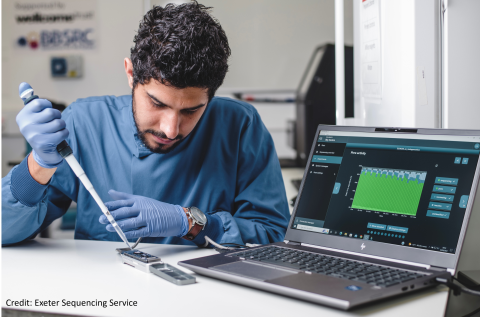You are here
- Home
- My experience training to use Nanopore's MinION
My experience training to use Nanopore's MinION

Oh wow, what an experience! Hi, I`m Anthony Scales and I have recently attended a weeklong training with Exeter sequencing service focusing on using Nanopore`s MinION. Though before I get stuck into telling you about the experience, I`d first like to introduce myself as I`m a guest within the University of Exeter. I am a research technician with AstrobiologyOU at the Open University, Milton Keynes, where we aim to address the scientific, governance and ethical challenges associated with astrobiology. To do this we are looking to answer questions within four key themes:
- Finding evidence of life – including identifying habitable environments, the signatures that life may leave behind, and the ethical implications of looking for, and finding life.
- Planetary protection - protecting the Solar System from contamination from Earth and protecting the Earth from anything that may be brought back from space.
- The Earth as an analogue – using locations on Earth similar to those in space, investigating terrestrial microbial communities in extreme environments, and understanding and regulating the impact of this work on the local human communities.
- Societal impacts – including international development, engagement, education, ethics and inclusion, and the application of AstrobiologyOU’s research to meet societal needs.
My main role is in supporting the microbial research that is carried out within these themes, particularly using anaerobic/aerobic culturing and nucleic acid techniques. As part of my professional development, I wanted to learn the various steps required for using a Nanopore MinION sequencing device. This is mainly so that I can start carrying out sequencing in-house although there is the added benefit of being able to carry out sequencing in-situ at the sample site or undertake bioprospecting leading to further investigations into specific areas.
I wanted to learn from experts in the sequencing field, who carry out this type of work routinely and so I contacted Exeter Sequencing Service, after previously working alongside them in collaborative work and being extremely impressed. This training visit was no different and I was welcomed back like an old friend, were I felt welcomed from my first step within the building to my last step out.
We worked on native DNA samples which were in less-than-ideal concentrations and fragment lengths. However, Dr Karen Moore demonstrated wonderfully why it`s always worth consulting with experts and adjusted the recommended protocol to produce results from thin air, which certainly caused me uncontrollable smiling as I was a little cynical. Still gleaming from the sequencing success, I worked alongside Paul O`Neill to perform some bioinformatics training. I`m not ashamed to say the bioinformatics stages are not my forte, though Paul skilfully guided me through what was required and brushed my worries aside.
Throughout all of this training, Dr Aaron Jeffries would supply me with me with “nuggets” of information on various matters, which I`ve stored away in my lab book as many are invaluable and will no doubt save me many head scratches down the road.
I left the training feeling thoroughly inspired and excited to get back into the labs, yet slightly saddened at saying goodbye to so many amazing people. So, I wanted to finish in saying a final thank you to all of those that I met and made my visit even better than I could have imagined.
Author:
Anthony Scalesis a Research Technician with AstrobiologyOU